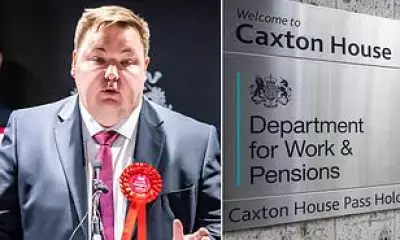Entertainment
Family-Friendly 'GOAT' Outperforms 'Wuthering Heights' in Quiet Box Office Weekend
Sony Pictures Animation's 'GOAT' leads North American box office with $17 million, edging out Warner Bros' 'Wuthering Heights' in a second-weekend showdown during a slow period for new releases.
Sports
Manchester City's Bernardo Silva Faces Suspension Risk After Third Yellow Card
Manchester City captain Bernardo Silva is walking a disciplinary tightrope, with two more yellow cards before the 32nd game triggering a two-match suspension that could see him miss the crucial Arsenal clash.
Politics
New UK Border Rules: Dual Nationals Face Passport Rush or £589 Fee
From February 25, 2026, dual British nationals must carry a UK passport or pay £589 for travel documents, affecting 1.2 million people globally.
Crime
Four Arrested in £3m Benefits Fraud Raids Targeting Stolen Identity Scam
Four suspects detained in dawn raids across south London and Berkshire over alleged £3million benefits fraud using hundreds of hijacked identities, with £150,000 in assets seized.
Business
Health
Weather
NYC Mayor Declares Emergency and Travel Ban for Blizzard
New York City Mayor Zohran Mamdani has declared a local state of emergency and issued a travel ban as the city prepares for its first dangerous blizzard in over a decade, with up to 24 inches of snow forecast.
NYC Mayor Declares Emergency and Implements Travel Ban
New York City Mayor Zohran Mamdani has declared a local state of emergency and ordered a travel ban as the city prepares for its worst blizzard in over a decade, with schools closed and non-essential vehicles restricted.
Thailand Hit by 6.5 Magnitude Earthquake After Borneo Quake
A significant magnitude 6.5 earthquake has struck Thailand, as reported by the German Research Centre for Geosciences. This seismic event follows a magnitude 6.8 quake in Borneo, highlighting regional tectonic activity.
US Northeast Braces for Blizzard with Heavy Snow and High Winds
A severe winter storm is hitting the US Northeast, with blizzard warnings from Maryland to Massachusetts, over 6,000 flights cancelled, and residents urged to stay indoors.
East Coast Blizzard: 12,000 Flights Delayed, 18 Inches Snow Forecast
A severe nor'easter batters the East Coast, causing massive flight cancellations and delays while forecasters predict up to 18 inches of snow and dangerous blizzard conditions across multiple states.
Tech
Get Updates
Subscribe to our newsletter to receive the latest updates in your inbox!
We hate spammers and never send spam
Environment
UK Geography Quiz: Test Your Knowledge
Challenge yourself with 100 multiple-choice questions about the geography of the United Kingdom. Perfect for students, travelers, and geography enthusiasts.











































